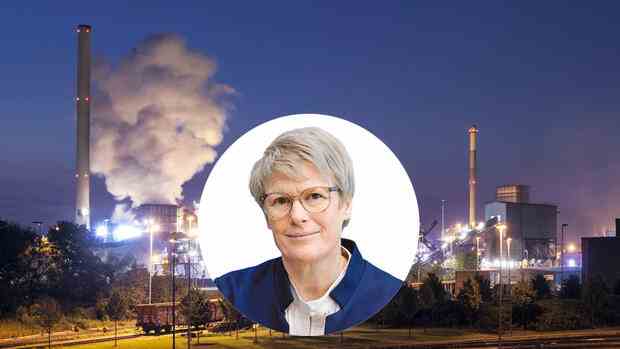Veronika Grimm is Professor of Economics at FAU Erlangen-Nuremberg and a member of the Advisory Council for the Assessment of Macroeconomic Development.
Hardly any question is discussed as lively in Germany as the danger of de-industrialization as a result of higher energy prices. However, one should not generalize here.
While the share of energy in the total costs is not significant in the automotive industry and mechanical engineering, for example, it is very high in sectors such as the steel and chemical industries. For energy-intensive industries, the conversion of production using climate-neutral hydrogen usually shows the only way to climate neutrality.
The challenges for the steel and chemical industries, for example, are immense. If one wanted to keep the energy-intensive production sites entirely in Germany, between 200 and 250 terawatt hours (TWh) of climate-neutral hydrogen would be required, depending on whether one electrifies as much as possible or largely relies on hydrogen. If the hydrogen were to be produced by electrolysis, this would result in an annual electricity requirement of 280 to 350 TWh for the energy-intensive industries. For comparison: The total German power generation last year was 580 TWh.
In Germany, it is planned to be able to produce between 28 and 35 TWh of hydrogen annually by 2030 – which will fall far short of the hydrogen demand of energy-intensive industries. So we will soon have to import large quantities of climate-friendly hydrogen.
In the future, hydrogen is likely to be produced primarily in locations where, unlike in Europe, local electricity demand is low and there are good conditions for renewable energies – for example on the Arabian Peninsula, in Canada or Australia, Namibia, Argentina or Chile. Most of the hydrogen would come to Germany by sea.
Cost savings of up to 25 percent
However, it is not easy to transport pure, gaseous hydrogen by sea. It must first be converted into a suitable liquid energy carrier. Options that will be available in the near future are further processing into ammonia and methanol, which are already being produced from hydrogen and traded and transported worldwide.
The optimal transport path depends not least on the planned use of the hydrogen. Steel production, for example, requires pure hydrogen. For other applications, it can be expected that imports of hydrogen derivatives will replace domestic production. In the chemical industry, for example, ammonia and methanol are intermediate products on the way to the production of fertilizers, formaldehyde and acetic acid.
Calculations show that around 25 percent of the costs for ethylene and fertilizer production could be saved if ammonia and methanol were imported from suitable foreign locations instead of producing these preliminary products in Germany. This is one of the reasons why the last major investments in the local chemical industry were made outside of Europe. If the decision about future production sites is made based purely on private-sector aspects, entire sites are likely to be relocated over time.
That could quickly overwhelm the regions affected in Germany. People are justified in fear of the abrupt change, the loss of jobs and the lack of alternatives.
That is why politicians, together with employers and trade unions, should quickly clarify how alternative employment opportunities can be created in the affected regions. In addition, care must be taken not to endanger the strategic sovereignty of Germany and Europe if important preliminary products are no longer produced on the continent and import dependencies arise due to a lack of diversification.
Politicians must use their instruments
It must be decided as quickly as possible which political course is necessary. In some sectors, such as the steel industry, maintaining sites makes sense – not least in order to build up technological competence in the new climate-neutral processes. But here, too, intermediate products such as sponge iron can sometimes be imported.
Where relocation of production cannot be prevented, new dependencies should be avoided as far as possible. For this purpose, preliminary products could be imported for which there are commodity markets, i.e. standardized and qualitatively consistent products are traded globally. Attention should also be paid to the diversification of supply relationships.
Politicians should consistently use the instruments at their disposal to prevent future dependencies. This includes the establishment of strategic partnerships with future trading partners as well as the guiding use of government guarantees. One thing is certain: there are enough countries from which we can import primary products. However, we must actively work towards not becoming unilaterally dependent again.
The author: Veronika Grimm is Professor of Economics at the FAU Erlangen-Nuremberg and a member of the Advisory Council for the Assessment of Overall Economic Development.
More: How does the green transformation of German industry succeed?
